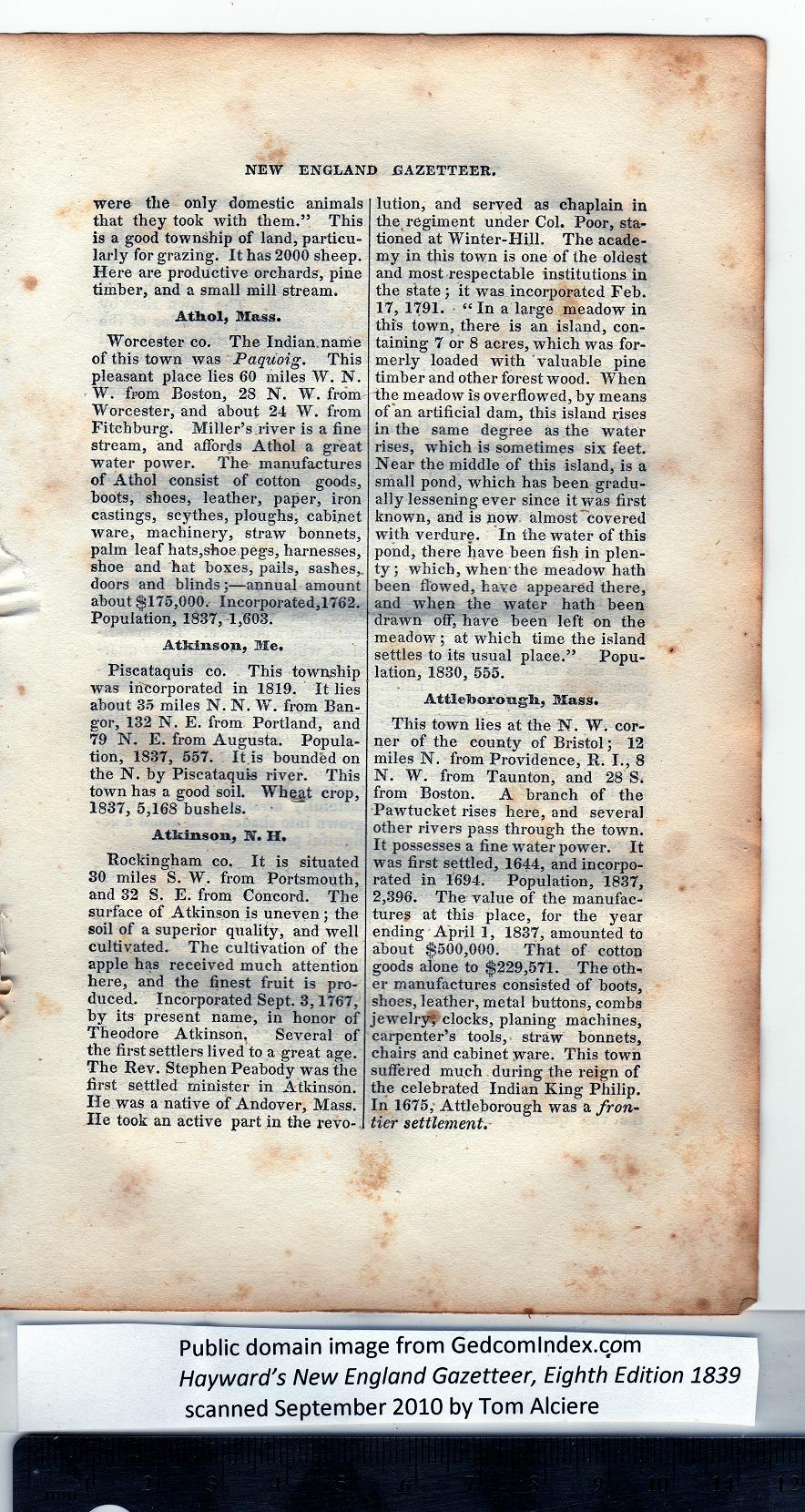|
were the only domestic animals
that they took with them.” This
is a good township of land, particu-
larly for grazing. It has 2000 sheep.
Here are productive orchards, pine
timber, and a small mill stream.
Athol, Mass.
Worcester co. The Indian.name
of this town was Paquoig. This
pleasant place lies 60 miles W. N.
W. from Boston, 28 N. W. from
Worcester, and about 24 W. from
Fitchburg. Miller’s .river is a fine
stream, and affords Athol a great
water power. The manufactures
of Athol consist of cotton goods,
boots, shoes, leather, paper, iron
castings, scythes, ploughs, cabinet
ware, machinery, straw bonnets,
palm leaf hats,shoe pegs, harnesses,
shoe and hat boxes, pails, sashes,,
doors and blinds;—annual amount
about $175,000. Incorporated,1762.
Population, 1837, 1,603.
Atkinson, Me.
Piscataquis co. This township
was incorporated in 1819. It lies
about 35 miles N. N. W. from Ban-
gor, 132 N. E. from Portland, and
79 N. E. from Augusta. Popula-
tion, 1837, 557. It is bounded on
the N. by Piscataquis river. This
town has a good soil. Wheat crop,
1837, 5,168^bushels.
Atkinson, N. II. |
Rockingham co. It is situated
30 miles S. W. from Portsmouth,
and 32 S. E. from Concord. The
surface of Atkinson is uneven; the
soil of a superior quality, and well
cultivated. The cultivation of the
apple has received much attention
here, and the finest fruit is pro-
duced. Incorporated Sept. 3,1767,
by its present name, in honor of
Theodore Atkinson. Several of
the first settlers lived to a great age.
The Rev. Stephen Peabody was the
first settled minister in Atkinson.
He was a native of Andover, Mass.
He took an active part in the revo-
lution, and served as chaplain in
thetregiment under Col. Poor, sta-
tioned at Winter-Hill. The acade-
my in this town is one of the oldest
and most respectable institutions in
the state; it was incorporated Feb.
17, 1791. “In a large meadow in
this town, there is an island, con-
taining 7 or 8 acres, which was for-
merly loaded with valuable pine
timber and other forest wood. When
the meadow is overflowed, by means
of an artificial dam, this island rises
in the same degree as the water
rises, which is sometimes six feet.
Near the middle of this island, is a
small pond, which has been gradu-
ally lessening ever since it was first
known, and is now almost'covered
with verdure. In the water of this
pond, there have been fish in plen-
ty; which, when'the meadow hath
been flowed, have appeared there,
and when the water hath been
drawn off, have been left on the
meadow ; at which time the island
settles to its usual place.” Popu-
lation, 1830, 555.
Attleborough, Mass.
This town lies at the N. W. cor-
ner of the county of Bristol; 12
miles N. from Providence, R. I., 8
N. W. from Taunton, and 28 S*
from Boston. A branch of the
Pawtucket rises here, and several
other rivers pass through the town.
It possesses a fine waterpower. It
was first settled, 1644, and incorpo-
rated in 1694. Population, 1837,
2,396. The value of the manufac-
tures at this place, for the year
ending April 3, 1837, amounted to
about $500,000. That of cotton
goods alone to $229,571. The oth*
er manufactures consisted of boots,
shoes, leather, metal buttons, combs
jewelry^ clocks, planing machines,
carpenter’s tools, straw bonnets,
chairs and cabinet ware. This town
suffered much during the reign of
the celebrated Indian King Philip.
In 1675, Attleborough was a fron-
tier settlement. |
